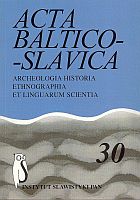Lietuvių etnogenezės preoblema žodžių darybos požiūriu
The Problem of Origin of the Lithuanian Nation from the Standpoint of Word Formation
Author(s): Saulius AmbrazasSubject(s): Language and Literature Studies
Published by: Instytut Slawistyki Polskiej Akademii Nauk
Keywords: Lithuanian language; Baltic languages; Lithuanian nation; ethnolinguistics; word formation (derivation)
Summary/Abstract: The greatest part of derivational features common to Lithuanian and Latvian was inherited from Proto-Baltic. Only some of them may be ascribed to exclusive East Baltic innovations. Besides, there are differences in the realization of them. In Latvian the suffix *-u-mo- (but not the suffix *-i-mo- in the contrast to Lithuanian) was widely used in the formation of nomina actionis. It is also noteworthy that the formation of Latvian nomina actionis was affected most radically by the adjectival suffix *-no- rather than *-mo-. A number of East Baltic innovations (cf. nominal diminutives with *-ēn-o, *-ā-ko, *-ē-ko) do not cover the entire territory of Lithuania, but usually the eastern part of it, which is supposed to be the mother land of the Lithuanian nation. On the other hand, a number of derivational isoglosses link the Lithuanian language to Old Prussian and oppose it to Latvian, cf. nomina collectiva with *-ī-no-; nomina agentis with *-i-ko-, nomina attributiva with *-in-ī-ko-, *-e-no-, *-āt-Uo-, *-ō-lUo-; nomina qualitatis with *-ī-bē, *-ī-s-tā, *-is-ko-; diminutives with *-o-l-Uo-, *-i-s-t-Uo-. Some of these isoglosses might reflect the influence of West Baltic tribes (they were very early drawn into the processes of European civilization) upon the Lithuanian language (especially upon its western and southern dialects) in the initial stage of its development.
Journal: Acta Baltico Slavica
- Issue Year: 2006
- Issue No: 30
- Page Range: 61-87
- Page Count: 27
- Language: Lithuanian

